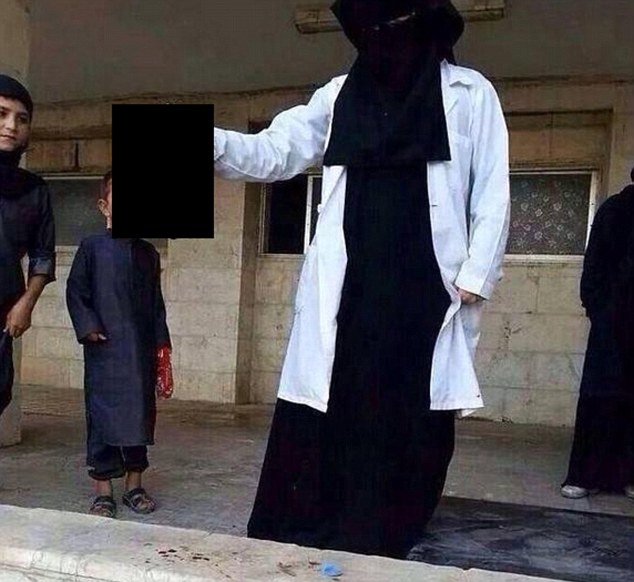How to defeat ISIS
Fareed Zakaria:
What does ISIS want?
The barbarism of the attacks in Paris mark a new low in terror. The attacks were not directed against national symbols or government targets, but designed simply to kill innocent men, women and children. The murderers did not even bother to issue demands.
French President Francois Hollande has called Friday’s attacks an act of war. They were worse. War has a goal. It’s fought by soldiers against soldiers. This is nihilism — violence as an end in and of itself.
That doesn’t, however, answer the question what to do. In the wake of the attacks, people rightly ask, what could France have done better? What could the United States have done better? And people are offering up various solutions regarding borders, visas, police procedures and the battle against ISIS in Iraq and Syria.
Would this really have prevented this kind of attacks?
As The New York Times has noted, France already has in place very tough anti-terrorism policies at home. The United States has been expanding its war against the terror group for a year.
It has spent about $5 billion and launched over 8,000 airstrikes against ISIS with its coalition partners. Would more strikes have resulted in fewer terrorist responses by ISIS? Would the various policies that people have advocated — no fly zones, safe havens, special operations forces — have stopped the Paris attacks?
We don’t know the details yet, but the attacks appeared to have been carried out by seven or eight people, some locals, some outsiders, armed with weapons that are easily obtainable anywhere in the world, coordinated in the sense that they all attacked at about the same time.
They chose soft targets that are difficult to defend — cafes and concert halls. This didn’t require vast sums of money, complex logistics or great cunning. It just required barbarity and a willingness to die.
Now it is easy to imagine the likely responses from the West. The war against ISIS will intensify with the United States and France, possibly even sending troops in there. At home it will mean more domestic laws and tougher police efforts to monitor and arrest people.
Given the news about terrorists posing as refugees it could mean that borders will be closed. The government will spy on communications more intrusively. It will fuel the rise of nationalist politicians everywhere, and mistrust between the Muslim and non-Muslim communities will grow.
It’s worth asking, what does ISIS want? By most accounts it wants all of this, a world divided between Muslims and non-Muslims. Its propaganda stresses that the West is intractably anti-Muslim. And as Graeme Wood notes, it has always openly tried to draw Western forces into Iraq and Syria hoping to make itself the great army of believers, fighting the crusaders.
Imagine if the West could respond to these terror attacks with increased and more effective efforts both at home and abroad, but also with the determination to demonstrate that it would act but not overreact. That it would reaffirm its basic values and it would strive to restore normalcy in the face of brutality. To do this would be to understand that terrorism is unique in that it depends for its effectiveness on the response of the onlooker.
If we are not terrorized then it doesn’t really work.
Fareed Zakaria is host of CNN’s “Fareed Zakaria GPS.”
Danielle Pletka: Establish safe zones
Right now, the United States has no strategy to defeat ISIS (or al Qaeda or any other radical Islamist group). The measures taken by the Obama administration are reactive, incremental and without any clear goal other than to gently push back on ISIS, limit territorial gains and eliminate troublesome individuals. Efforts to work with local partners, which should be a key element of any strategy, have been at best halfhearted. And reliance on regional allies has failed to appreciate their differing ambitions for an endgame in Syria, Iraq, Yemen and elsewhere.
Any winning strategy will recognize that there are a series of different battles to be fought. ISIS in Syria cannot be a target while ISIS in Iraq is ignored. Similarly, the Houthis cannot be a target in Yemen while al Qaeda in the Arabian Peninsula goes free. More advisers and more troops are necessary in several theaters, and an aggressive effort to build up local forces and allies needs to begin.
But the military element, while essential, is not enough to permanently reduce the power or appeal of terrorist groups across the Middle East. Something must take their place. The answer is not to find a new secular dictator or whitewash the old one. Rather, Washington must work to establish safe zones and transitional governments that can eventually take power when the battles subside.
Danielle Pletka is senior vice president of foreign and defense policy studies at the American Enterprise Institute.
How must the war on ISIS change to win?
If “winning” is defined as elimination of all suicide attacks, complete security in every city in every nation, a return of refugees to a safer homeland and a gradual reduction of a radical ideology, there are few things we can do to achieve a quick win against ISIS.
This kind of war instead requires a more pragmatic approach. I’ve heard it called “continuous gaining.” Americans want a quick victory, but that ain’t gonna happen.
Still, here are some suggestions:
— To gain, we must continue our current advise, train and equip plan (having fought in this region, more U.S. ground maneuver forces are not the solution) and recruit more nations — especially Arab ones — into the military coalition. Indigenous Arab nations and not Western ones must provide the ground force
— Continue the air campaign, and increase targeting as we gain more intelligence (we’ll get a lot more of this due to newly embedded special operators and special forces). Keep up the pounding, while getting more nations actively involved in the coalition.
— Publicly reward Iraqi Prime Minister Haider al-Abadi’s military and governmental efforts in Iraq and Iraqi Kurdish President Massoud Barzani’s military efforts in the Kurdish region. We should continue to admonish Vladimir Putin’s support of the Bashar al-Assad regime (even when he falsely claims he is countering ISIS). And we should keep the pressure on Turkish President Recep Tayyip Erdogan to completely eliminate the two-way flow of ISIS fighters across Turkey’s borders.
— Find better ways to share intelligence. We’ve made great strides in the United States post 9/11, but European transnational intelligence sharing receives only a C+/B- grade; the sharing of internal national intelligence gets failing marks. As ISIS adapts and shifts their fight outside Syria and Iraq into Europe (and the United States) this is critical.
— Use international laws and monitoring of fiscal transfers to stop the funding of ISIS (and other terrorist organizations). There is effort in this area, but not enough.
— Revise and renew a version of the Patriot Act, applicable to the current threat. In war, certain civil liberties will suffer, yet we have been loathe to even address this area.
Finally, Imams, Muslim governmental leaders and Islamic organizations must continuously and repeatedly condemn ISIS in the media and in the mosques.
Lt. Gen. Mark Hertling is a national security, intelligence and terrorism analyst for CNN. He served for 37 years in the U.S. Army, retiring as the Commanding General, U.S. Army Europe and Seventh Army.
ISIS’s state-building and apocalyptic messianism had co-existed in an uneasy tension — at least until now. With the Paris attacks, ISIS has — potentially — made its first obvious, huge miscalculation. I say “potentially,” because the United States and its allies have an unfortunate track record of responding to terrorism in the wrong ways.
What’s remarkable is that a year and a half has passed since ISIS took Mosul and not a single country has made fighting ISIS a top foreign policy priority. The Obama administration has seemed listless and reluctant, as if dealing with an unfortunate nuisance rather than one of the most challenging — and dangerous — geopolitical threats of our time. The question today is whether ISIS’s attack on Paris is what finally pushes the United States to play a more persuasive leadership role and to develop a strategy, particularly where we haven’t had one — in Syria.
Yet, already, some are calling to join hands with Syrian dictator Bashar al-Assad (whose policies are a root cause of ISIS’s rise) as well as Russia. There is always the temptation to see brutal authoritarian regimes as effective allies against terror, when they very rarely are. These are the kinds of Faustian bargains that invariably come back to haunt us. Looking for quick wins, such bargains seem more attractive in the short-term, in part because we’ve lost our ability to think creatively about our long-term involvement in the region.
Meanwhile, at home, conservative politicians are falling into the very trap Islamic extremists always set for us. ISIS and its ilk want to fashion a clash of civilizations. They want this to be “us versus them.” They want to exploit growing anti-Muslim and anti-refugee sentiment to push a narrative that French Muslims and Western Muslims more generally will never be fully accepted by their countrymen.
ISIS is rather clear about this intent: they wish to extinguish the “gray zone” and provoke a sort of apocalyptic world war, where Muslims are forced to choose sides. Perhaps these politicians are unaware that the point of terrorism is to provoke target populations to do things they otherwise wouldn’t do. Let’s start by not doing it for them.
Shadi Hamid, a senior fellow at the Project on U.S. Relations with the Islamic World at the Brookings Institution’s Center for Middle East Policy, is the author of ”Temptations of Power: Islamists and Illiberal Democracy in a New Middle East.”
Lt. Col. Rick Francona: U.S. needs eyes on targets
What the U.S.-led coalition is doing currently to achieve President Barack Obama’s stated objective to “degrade and ultimately defeat” ISIS is not working. The original plan to use American and allied air power to support Iraqi military and Kurdish peshmerga troops in Iraq, and a cadre of U.S.-trained Syrian rebels in Syria has failed.
How can the U.S. and allies turn things around?
First, they must recognize that ISIS is no longer confined to operations in Iraq and Syria. It has become a regional — and, after the attacks in Paris — international threat.
But while we need to take the fight to ISIS wherever they are — the American airstrike in Libya that killed the local ISIS leader is a start — the main effort must focus on ISIS’s key facilities in Iraq and Syria, including the self-proclaimed capital of Raqqa.
Thus far, the U.S.-led coalition air campaign has been anemic at best — many of the armed sorties return to base with unexpended ordnance. Coalition pilots are hamstrung by over-restrictive rules of engagement and an unrealistic belief in Washington that air strikes can be conducted with nearly zero collateral damage.
An effective air campaign requires some U.S. troops on the ground, American eyes on targets. The targets presented by ISIS are difficult to detect, isolate and validate inside of the cumbersome U.S. decision cycle — the time required for a pilot to receive authorization to strike a target.
I have recommended that we use American troops on the ground — a few special operators (Army or Air Force) embedded with our Arab or Kurdish allies — to control the airstrikes. I call this the “Afghan model” — similar in concept to using U.S. special operations personnel embedded with Afghan Northern Alliance fighters to effectively target al Qaeda and Taliban formations, facilities and fighters. It worked there, it could work in Iraq and Syria.
If we are committed to conducting an air campaign, we need to do it right. We spent years perfecting the tools and tactics to employ precision-guided munitions effectively from the sky — let’s use the whole team: pilots in the air and combat controllers on the ground. Then let them do their jobs without micromanagement from Washington.
Lt. Col. Rick Francona is a retired U.S. Air Force intelligence officer and Middle East specialist who served in Syria, Iraq, Jordan, Lebanon and Saudi Arabia. He is currently a CNN military analyst.
Shadi Hamid: Don’t give ISIS what it wants
Any international military campaign against ISIS must go beyond just air strikes. But the ideology underpinning ISIS must also be tackled. The groups’s half-truths have to be countered and dismantled, otherwise ISIS’s global assembly line will continue to recruit and radicalize not just young men, but women and entire families.
ISIS’s ideology and plan of action is based on the treatise “The Management of Savagery,” which seeks to “vex and exhaust” its target states and create “savagery and chaos” in order to force the society to “suffer from the absence of security.” ISIS is also now advocating marauding mass-casualty attacks that are coordinated, synchronised and aimed at creating economic, political and social repercussions. If it continues to follow this doctrine, then we should expect to see targeted attacks in Europe and North America.
ISIS’s greatest strength is its illusion of power, a fact that also makes its brand vulnerable. Various names have been used to assert the terror group’s power projection: The Islamic State of Iraq and the Levant (ISIL); Islamic State of Iraq and Syria/al-Sham (ISIS); Islamic State (IS). ISIS endorses the use of all of them because despite nuanced differences, “Islamic State” is attached, creating brand recognition. Therein lies the problem.
A far better way to describe the group is Al-Dawla al-Islamiya fi al-Iraq wa al-Sham (Daesh). The term “Daesh” still accurately spells out the abbreviation of the group’s entire Arabic name. Phonetically it is similar to the Arabic word “Dahes” or “one who sows discord” and Daesh can also be understood as a play on words and an insult in Arabic slang. Depending on the context of its meaning in Arabic, Daesh can mean “To trample down and crush” or “a bigot who imposes his view on others.”
Most transnational terrorist groups have generally been referred to by their indigenous names and not by the anglicized equivalent. Al-Qaeda was not called “The Base,” for example, while the Taliban are not identified as “The Students.”
So lets call the group what it is — and help undermine a brand that has been appealing to too many.
Sajjan Gohel is international security director for the London-based Asia-Pacific Foundation, a think tank monitoring emerging geopolitical threats and analyzing the radical ideologies that feed violent extremism. He is also senior advisor to the Partnership for Peace Consortium’s Combating Terrorism Working Group.





